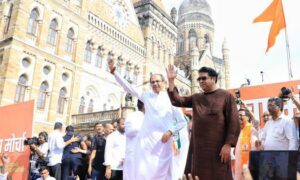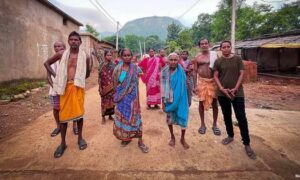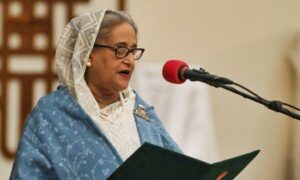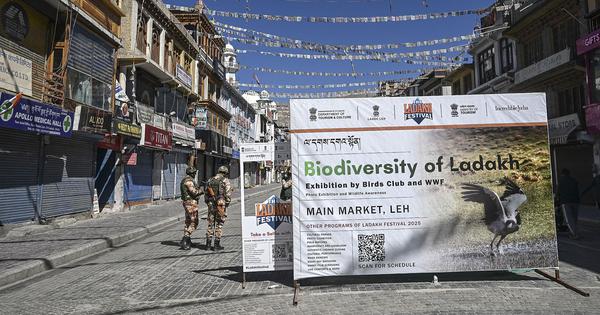
A “Chinese agent”. A Bangladesh supporter. A foreign-funded agent. An instigator of violence and a threat to Indian sovereignty. These are among the falsehoods being circulated about Ladakh climate activist Sonam Wangchuk who was arrested and jailed on September 26.
The Indian government has blamed Wangchuk after violence broke out on September 24 in Leh during protests to press for Ladakh’s long-standing demand for statehood and autonomy.
Wangchuk was detained under the stringent National Security Act and imprisoned in Jodhpur, Rajasthan. Since then, cropped videos of Wangchuk’s speeches, old photographs and distorted translations of his remarks are being circulated as part of a vilification campaign to manufacture consent for his incarceration.
But this brushes aside inconvenient facts: for one, Wangchuk was a key government point-person on Ladakh and environmental issues. Second, and more importantly, the ruling Bharatiya Janata Party has, in its manifestos for the 2019 general elections and the 2020 hill council elections, promised Sixth Schedule Status and greater autonomy to Ladakh, but never followed through.
In 2019, three ministries of the Narendra Modi government greenlit the recommendation of the National Commission for Scheduled Tribes to include Ladakh as a tribal area under the Sixth Schedule of the Constitution. But the Centre has been dragging its feet since then: the high-level committees it has set up for talks have never taken up this suggestion.
Ladakh’s protests for statehood and inclusion in the Sixth Schedule of the Indian Constitution have been underway since 2020. The region has over 95% tribal population and a fragile ecosystem. Sixth Schedule inclusion will grant autonomy by empowering Ladakh’s District or Hill Councils to made decisions on land, water, agriculture and forests.
Over the last four years, the Leh Apex Body, formed in 2020, and the Kargil Democratic Alliance, formed in 2021, have jointly led the movement. Wangchuk is a member of the Leh Apex Body.
On September 10, a group of 15 people, including Wangchuk, began a 35-day peaceful hunger strike to press for Ladakh’s demands. For two weeks, the protest was peaceful, though largely neglected. At some point the Centre announced yet another date for a committee meeting, but only in October.
Frustrated by all the foot-dragging, on September 24, a bandh was called by youth groups associated with the Leh Apex Body and religious groups in Leh. This erupted into violence. Police firing killed four people and injured several more.
Instead of addressing the pressing question of why the Centre continues to renege on its own promises and deny the people of Ladakh the right to govern themselves, Wangchuk is being attacked to delegitimise him and the movement he helps lead.
Here are some of the canards being circulated about him.
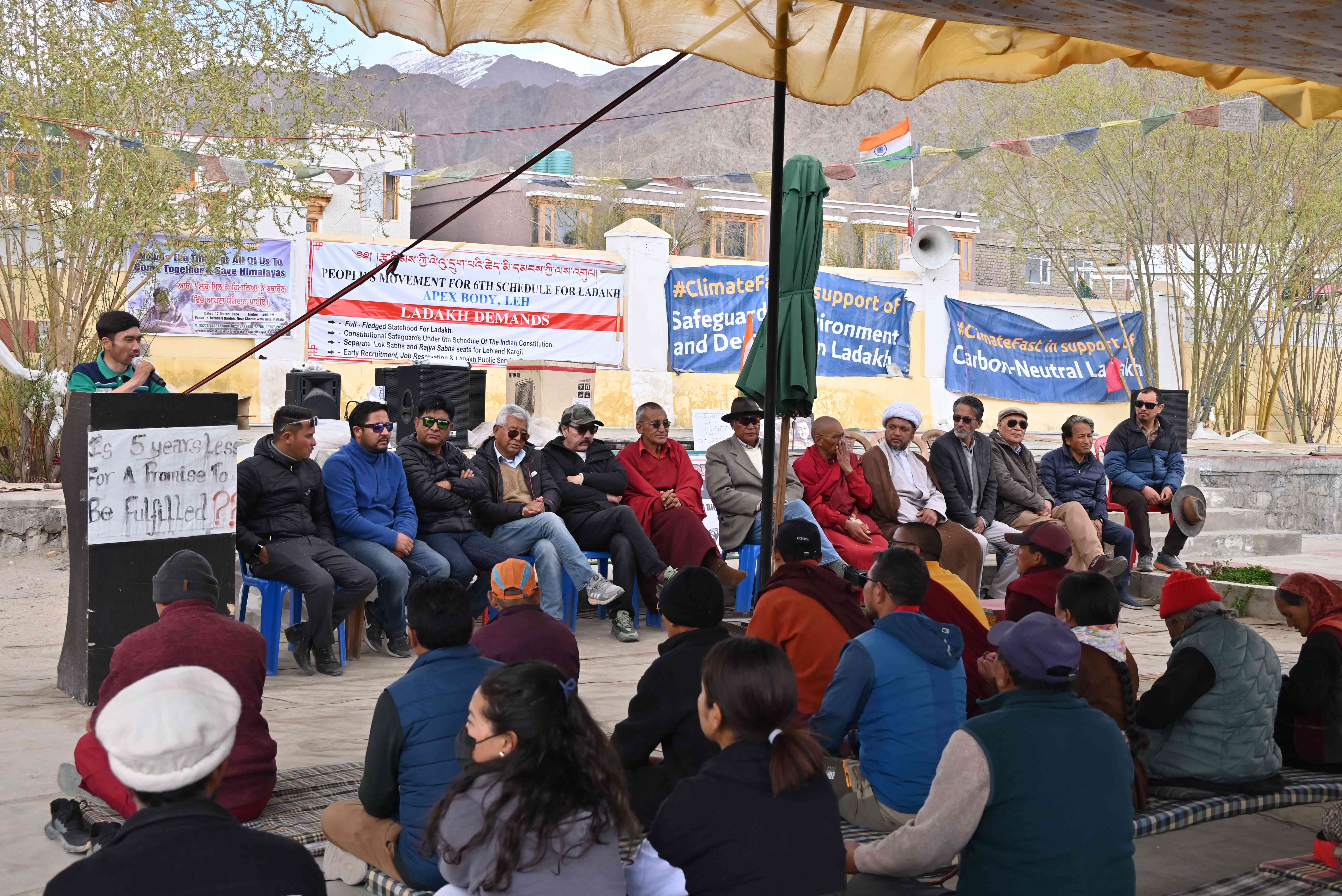
1. Sonam Wangchuk incited violence by making speeches that referred to the overthrowing of governments in Nepal, Bangladesh and Sri Lanka.
On September 24, the day violence broke out, the BJP’s social media head Amit Malviya tweeted a 14-second video of Wangchuk speaking. Malviya claimed that Wangchuk had incited violence along the lines of the protests that led to the ouster of governments in Nepal, Bangladesh and Sri Lanka.
But Malviya shared a cropped version of Wangchuk’s 30-minute speech delivered on September 10. Wangchuk had then emphasised that the protests should be peaceful:
“Like many just said, ‘It is confirmed that a change will come.’ Change might have been there in Nepal, Bangladesh and Sri Lanka, the people will bring change. It will happen if someone dies…Ladakh will see change through peace, that too a peaceful revolution. A change must come from death…from staying hungry, which will also affect other places. Ladakh will then become an example for other places. We will show that now is the time we die by starving ourselves instead of firing or killing others by bullet violently.”
Malviya’s false claim was also fact-checked by Boomlive.
2. Sonam Wangchuk did not appeal for peace when violence broke out
When news of violence emerged on September 24, Wangchuk immediately called for peace. In a video posted on his X handle at 2 pm, he made an appeal for calm to the young supporters of the movement: “I request the youth of Ladakh to stop the violence forthwith, as it only causes harm to our cause and further deteriorates the situation. We do not want instability in Ladakh and the country.”
By 4 pm that day, Wangchuk had ended his 15-day fast.
3. Sonam Wangchuk visited Pakistan with sinister motives
In February, the United Nations invited Wangchuk to speak about climate change at a conference in Pakistan. The conference was attended by delegates from South Asian countries, including India.
Wangchuk was part of a panel on “Glacial Melt: A Sustainable Strategy for the Water Towers of South Asia”, chaired by a UN coordinator. Wangchuk spoke about ice stupas, his innovation for storing winter water in the form of a conical tower. He also praised the Indian government and Prime Minister Narendra Modi for working on climate change.
The conference was held in February but raked up as a problem only seven months later. Here is a full video of Wangchuk speaking at the conference in Pakistan:
4. Sonam Wangchuk was in touch with a Pakistani spy
On September 27, Malviya claimed in a post on X that the Ladakh Police had arrested a Pakistani intelligence operative who had been in touch with Wangchuk. Malviya cited a statement made by Ladakh Director General of Police SD Singh Jamwal.
But in the press conference, Singh only mentioned that a Pakistani operative had been arrested for sending information across the border. Singh states this at the 10.20-minute mark in the video. No evidence was presented in support of the insinuation that the Pakistani operative was part of the Ladakh movement or working with Wangchuk.
The Union government is responsible for national security as well as the security of Indian citizens. That a foreign national was spying on an Indian citizen or movement and passing that information to Pakistan is a major security lapse. This information would have been available to the government much before when Wangchuk was detained. Why was no action taken against this foreign operative earlier?
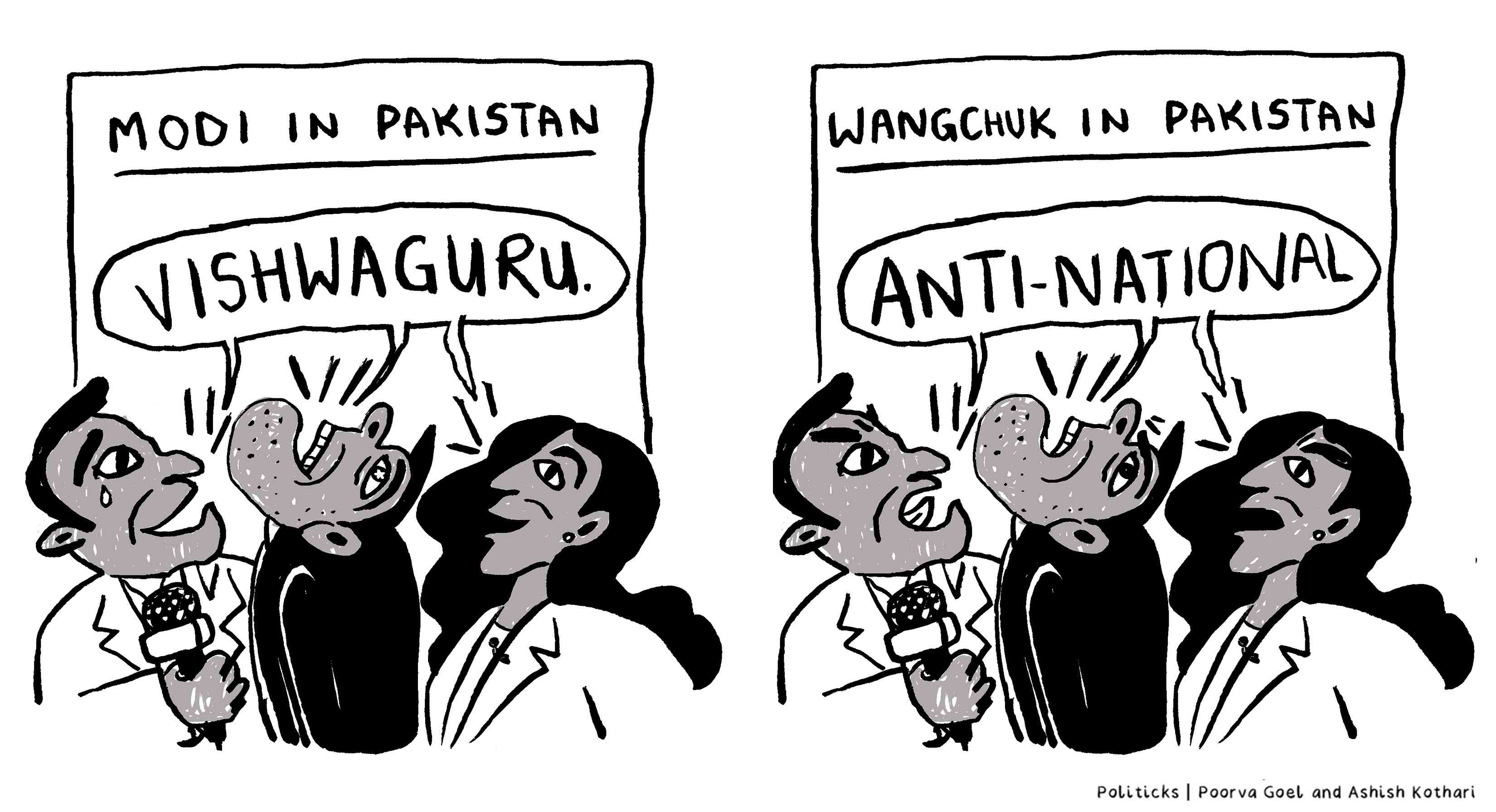
5. Sonam Wangchuk wanted a violent protest, like the Arab Spring
In a video uploaded on June 8 titled “Let’s Trust the Government, But Be Ready for Sacrifices”, Wangchuk talked about his vision for Ladakh and the next step in the struggle for autonomy. He spoke of Ladakh as a “mother” to its people and said that they cannot allow Ladakh to be dismembered or broken into pieces and sold to rich businesses and industrialists. “How unfortunate and unworthy we are as the children of Mother Ladakh that we are failing to even speak up,” he said.
Far from advocating for violence or even talking about it, Wangchuk spoke about the sacrifices made by Indian freedom fighters like Mohandas Gandhi’s struggle against the British, and Potti Sriramulu of Andhra Pradesh, who died during a fast seeking statehood.
After speaking about Gandhi, at the 29:37-mark in the video, Wangchuk reminded viewers of Sriramulu’s sacrifice for separate statehood for Andhra Pradesh. At the 30:28-mark, Wangchuk spoke about the Arab Spring – a series of mass uprisings across the Arab nations that began in 2010. Wangchuk remembered Mohamed Bouazizi, a Tunisian fruit and vegetable seller who sacrificed his life through self-immolation, after being driven to despair by the torture, subjugation, and corrupt leaders.
Wangchuk said it is his duty to protect his “Mother”, and if need be, he is prepared to sacrifice himself. He referred to self-sacrifice as part of a Gandhian approach of inflicting suffering on oneself rather than on others. None of this can be described as inciting the people of Ladakh to indulge in violence, or act against the country.
6. Sonam Wangchuk was inciting violence along with Congress leaders
At a press conference on September 24, BJP parliamentarian and spokesperson Sambit Patra claimed that Congress councillor Stanzin Tsepag had instigated the Ladakh violence. Malviya and other pro-government accounts shared images of a person holding a weapon and claimed that he was Phuntsog Stanzin Tsepag, the Congress Councillor from the Upper Leh Ward.
Alt News later established that the claim was false and that the person whose photographs were widely circulated did not bear any resemblance to the real Tsepag.
Wangchuk also clarified that the Leh Apex Body had in fact asked the Congress to exit the struggle platform. The BJP, which was also initially with the Apex Body, had left the forum to maintain political neutrality.
7. Sonam Wangchuk is a Chinese agent
Wangchuk has repeatedly spoken against Chinese incursion into the Indian territory in Ladakh and its implications for national security as well as the livelihood of pastoralists in Ladakh.
In April 2024, Wangchuk organised a Pashmina March to highlight the Chinese occupation of Indian territory. The administration used its powers under Section 144 and prohibited the march. Wangchuk has also led campaigns to boycott the purchase and consumption of Chinese products in India. Multiple videos from five years ago about his resistance to China are available on Wangchuk’s YouTube in the “China Ko Jawab” series.
Even so, late in September, some television news channels and social media accounts circulated a video clip that claims to show Wangchuk saying he would help China invade India. But the full clip shows that Wangchuk was quoting a comedian saying this, pointing to the growing frustration amongst Ladakhis, and asking the administration and Centre to solve the problem.
8. Sonam Wangchuk is a foreign-funded agent
On September 25, the Indian government cancelled the foreign funding licence of Wangchuk’s institute, the Students’ Educational and Cultural Movement of Ladakh. The government alleged that the institute received foreign funds to study national sovereignty which is against “national interest” and is in violation of the Foreign Contribution (Regulation) Act, 2010. This is a distortion of facts.
The institute, in response to a notice from the home ministry, had said that it had received funds for “creating awareness among youth on issues such as migration, climate change, global warming, food security and sovereignty, and organic farming through different workshops and trainings”.
But in its order cancelling the institute’s licence under the Foreign Contribution (Regulation) Act, the government changed “food sovereignty” to “national sovereignty”. The order said the institute had “admitted” that it received funds for “study on Sovereignty of the country including some other topics and the fund had also been spent in line with the objectives of the foreign donors”. The order said that Foreign Contribution cannot be accepted for study on Sovereignty of the nation. “This act of the association is against the national interest of the Country in violation of section 12(4)()(0) of the Act.”
9. Sonam Wangchuk is aligned with Bangladesh’s Muhammad Yunus
A photograph of Wangchuk with Chief Adviser of Bangladesh Muhammad Yunus was used to link the Ladakh activist with the uprising in Bangladesh that ousted the Sheikh Hasina regime. But that photograph is from five years ago when Yunus was not in politics and was only known as a Nobel Laureate and founder of Grameen Bank. There are also photos of Modi with Yunus – from 2015 and April 2025.
A 2020 photo of Ladakhi activist Sonam Wangchuk with Bangladeshi economist and head of the country’s interim government Muhammad Yunus is being shared with misleading claims after the Sept 24 violence in Leh | @onkeyta_ https://t.co/C00w58Z7tX
— Mohammed Zubair (@zoo_bear) September 27, 2025
Once celebrated, now vilified
Up until recently, Wangchuk was the Indian government’s point person for issues related to Ladakh and the environment. The Modi government had approached Wangchuk to participate in events such as Azadi Ka Amrit Mahotsav and World Heritage Week.
In April 2022, BJP National Secretary Vinod Tawde publicly thanked Wangchuk for “working together towards betterment of our nation, specially welfare of our students”. In December 2019, Arjun Munda, who was then the Union tribal affairs minister, acknowledged Wangchuk’s fight for granting Ladakh Scheduled Area status.
Senior officers of the Indian Armed Forces, when serving in Ladakh have praised Wangchuk and especially mentioned his contribution such as solar tents that the army is using, like retired Major General Yash Mor in this interview.
Planted narratives and opportunistic falsehoods cannot derail a movement and a person, both built on Gandhian ideologies with a commitment to the nation, local governance, environmental sustainability, the protection of bio-cultural heritage, non-violence and satyagraha.
Corporate takeover
The discovery of rare-earth minerals and a proposed 48,000-acre mega-solar project in Changthang are clear indicators of corporations eyeing Ladakh’s land, currently used by pastoral and farming communities, and which support a unique ecology and wildlife.
Granting Ladakh Sixth Schedule status under the Constitution of India would hamper a corporate takeover of the land. This is likely the real reason why Ladakh is denied Sixth Schedule Status and statehood and why Wangchuk and several other colleagues remain in detention.
Rishi Anand is a political activist based in Patna. Kavitha Kuruganti is an activist based in Mysuru. Ashish Kothari is an activist-researcher based in Pune.
📰 Crime Today News is proudly sponsored by DRYFRUIT & CO – A Brand by eFabby Global LLC
Design & Developed by Yes Mom Hosting


